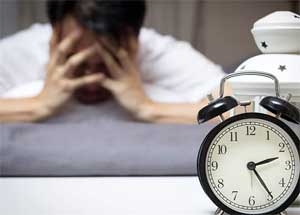- Home
- Editorial
- News
- Practice Guidelines
- Anesthesiology Guidelines
- Cancer Guidelines
- Cardiac Sciences Guidelines
- Critical Care Guidelines
- Dentistry Guidelines
- Dermatology Guidelines
- Diabetes and Endo Guidelines
- Diagnostics Guidelines
- ENT Guidelines
- Featured Practice Guidelines
- Gastroenterology Guidelines
- Geriatrics Guidelines
- Medicine Guidelines
- Nephrology Guidelines
- Neurosciences Guidelines
- Obs and Gynae Guidelines
- Ophthalmology Guidelines
- Orthopaedics Guidelines
- Paediatrics Guidelines
- Psychiatry Guidelines
- Pulmonology Guidelines
- Radiology Guidelines
- Surgery Guidelines
- Urology Guidelines
Treatment of sleep disorders may prevent suicide in veterans, finds study

Treatment of sleep disorders may prevent suicide in veterans, finds a study.
Sleep is the most important activity of the entire day. Sleep disorders can lead to detrimental mental and health effects. A new has found that sleep disorder treatments can reduce suicide attempts risks in veterans, revealed a study in journal Sleep Medicine.
Previous research has investigated the link between sleep disorders or disturbances and suicide attempts. But less has been explored to look at specific sleep problems, and little research has examined the role of sleep medicine interventions and suicide attempt risk.
Bishop et al and colleagues of the Center of Excellence for Suicide Prevention, Canandaigua (N.Y.) VA Medical Center, and the department of psychiatry, University of Rochester (N.Y.) Medical Center, extracted suicide attempts, treatment utilization, and psychiatric diagnoses from electronic medical records and a suicide attempt database from the U.S. Department of Veterans Affairs.
The sample consisted of patients with any record of suicide attempt in FY13-14 and a 1:1 case-control of patients with no record of attempt, who were propensity score-matched based on age, gender, and prior-year mental health treatment utilization. Associations among sleep disorders and suicide attempt were examined via logistic regression. Covariates included depression, anxiety, posttraumatic stress disorder (PTSD), bipolar, schizophrenia, substance use disorder (SUD), medical comorbidity, and obesity.
Insomnia, nightmares, and sleep-related breathing disorders were positively associated with suicide attempt after accounting for age, gender, treatment utilization, and comorbid sleep disorders. When further controlling for depression, anxiety, PTSD, bipolar, schizophrenia, SUD, medical comorbidity, and obesity, insomnia but neither nightmares nor sleep-related breathing disorders remained positively associated with a suicide attempt. Additionally, sleep medicine visits 180 days prior to the index date were associated with a decreased likelihood of suicide attempt for individuals with sleep disorders.
"Insomnia is associated with suicide attempt among veterans. Sleep medicine visits were associated with a reduced risk of suicide attempt in sleep-disordered patients. The assessment and treatment of sleep disorders should be considered in the context of strategies to augment suicide prevention efforts." concluded the authors.
For further reference log on to :
doi: 10.1016/j.sleep.2019.07.016.

Disclaimer: This site is primarily intended for healthcare professionals. Any content/information on this website does not replace the advice of medical and/or health professionals and should not be construed as medical/diagnostic advice/endorsement or prescription. Use of this site is subject to our terms of use, privacy policy, advertisement policy. © 2020 Minerva Medical Treatment Pvt Ltd